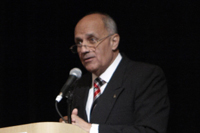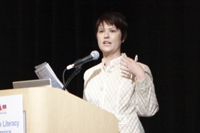February 11
Richard H. Carmona, MD, MPH, FACS • Jennifer Cabe, MA
0 comments

Richard Carmona, MD, 17th Surgeon General of the United States (2002-2006) and President of Canyon Ranch Institute, has spent 11 years preaching the gospel that health literacy involves cultural competency, and both are integral, not ancillary, to public health. To underscore the point, he joked that the degree he really needed, in addition to being an MD and RN and having a Masters of Public Health, was in anthropology. But he is still pondering the question of how to operationalize that gospel. The question, he says, is not about the science. It is about how to deliver health information in a way that creates sustainable behavior change.
During his presentation, Dr. Carmona recounted several experiences that taught him about execution and operationalizing. He described being at a fast food restaurant with his family. When he realized that many people recognized he was the Surgeon General of the United States, and that he was holding a French fry, he immediately dropped it. There, he said, was a great opportunity for teaching and learning when he dropped that fry.
As the Surgeon General, he wondered, for whom do we write the Surgeon General reports? Are they for the people? He realized that his grandmother who never spoke English would not be able to use the information in reports like a 900-pager on smoking cessation. How, he wondered, does that information get to people so they can take action? As a result, his team created “The People’s Piece” to ensure that the best science available was offered in a way that was understandable and culturally appropriate.
Dr. Carmona told the audience that we need to create resonant messages that change lives, to take what we know and get it out to all providers. So much of what we are trying to tell people is simple: wear a seatbelt, don’t smoke, walk a little. If we don’t have the ability to get the information to the people who need it, he says, we’re all going to pay. If we don’t engage the public, we will perish. But with the knowledge we have, we can do this.
[divider]

Jennifer Cabe, Executive Director of Canyon Ranch Institute, provided perspective on how health literacy plays out in light of the Affordable Care Act. It is, she says, a crack in the wall between people who need access to the system, and the system. Though there are only five explicit mentions of health literacy in the ACA, it is infused throughout. However, there remains lots of work to do. Navigators are key to widening the crack in the wall. Accountable care organizations (ACOs), groups of hospital systems and physician groups working together to improve patient experience, care coordination, patient safety, and preventive health, will become the predominant form of healthcare.
Tags